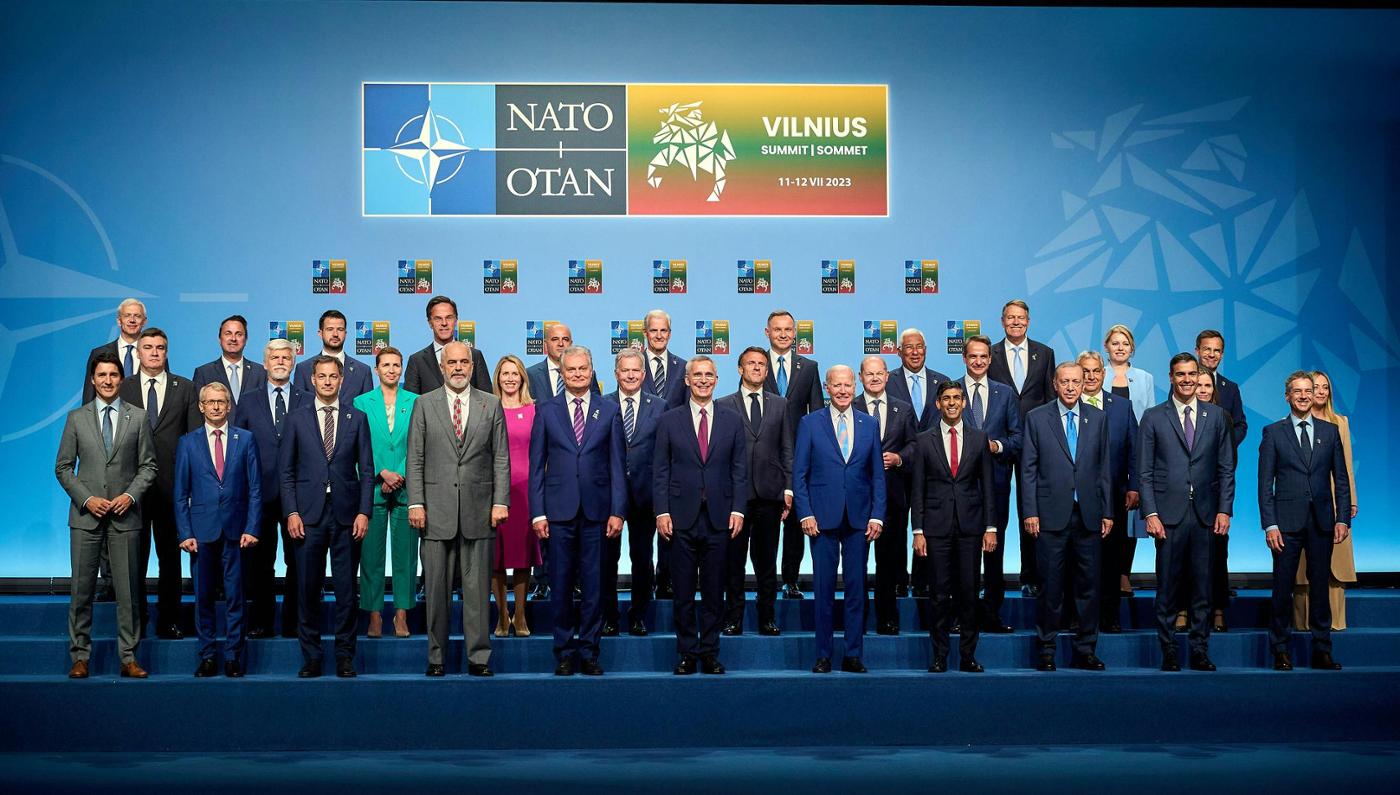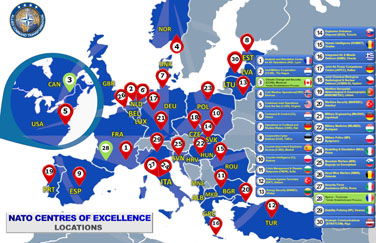NATO and the new Climate Change and Security Centre of Excellence

At the NATO Summit in Vilnius in July 2023, Allies welcomed the establishment of a NATO Centre of Excellence for Climate Change and Security in Montreal, Canada.
Here are excerpts from several articles about NATO’s Approach to Environment, Climate Change and Security and the new NATO Climate Change and Security Centre of Excellence (CASCOE).
Photo: Official photo of the NATO Secretary General and Heads of State and Government at the 2023 Vilnius Summit. © NATO
Implementing NATO’s Climate Security Agenda: Challenges Ahead
Extract: While NATO has been paying attention to environmental challenges for over 50 years now – mostly through a wide range of scientific research activities – it was not until recently that Allies agreed to take concrete action. At the 2021 Brussels Summit, NATO set itself the goal of becoming “the leading international organisation when it comes to understanding and adapting to the impact of climate change on security” and underpinned this ambition with the Climate Change and Security Action Plan.
The Action Plan identifies NATO’s role in the field of climate change and security along four lines of effort: enhancing Allied awareness of the security implications of climate change, promoting climate adaptation across all areas of NATO’s work, mitigating its effects by reducing military emissions, and enhancing outreach to other actors that are active in the climate security space. In regards to mitigation, NATO set concrete targets: at least 45% GHG reduction by 2030, reaching net zero by 2050. While the scale and ambition of NATO’s climate change and security agenda is unprecedented, challenges to its successful implementation remain. Some of them will be easier to overcome than others. This article draws together, reviews, and builds on existing research in an effort to provide a comprehensive and easily accessible compilation of the various issues that NATO must consider on its road to net zero, highlighting eight key challenges.
Source: Katarina Kertysova, Implementing NATO’s Climate Security Agenda: Challenges Ahead, NATO Review, 10 August 2023
NATO’s Approach to Environment, Climate Change and Security
Extract: The earth’s rapidly changing climate and an increase in weather extremes have led NATO to accelerate its efforts in environmental security and environmental protection. For decades, NATO has been dealing with environmental security issues that can lead to humanitarian disasters, regional tensions and violence. NATO provides disaster relief support; focuses on environmental risks to military activities and security in general, including environmental factors that affect energy supplies; and is looking for ways to improve energy efficiency in the military through innovative technologies.

The Royal Danish Navy frigate HDMS Triton is part of the Joint Arctic Command Denmark, which is responsible for fisheries control, search-and-rescue and environmental monitoring, and contributes to the security and defence of the High North. Photo: NATO.
At the NATO Summit in Vilnius in July 2023, Allies welcomed the establishment of a NATO Centre of Excellence for Climate Change and Security in Montreal, Canada.
On the margins of the Vilnius Summit, NATO released three major reports contributing to Allies’ increased understanding of the impact of climate change on NATO’s strategic environment, missions and operations, and the adaptation of armed forces to maintain operational effectiveness.
Source: Environment, climate change and security, NATO, 24 July 2023
NATO Climate Change and Security Centre of Excellence: Updates on the initiative
Extract: As the world’s leading political and military Alliance, the North Atlantic Treaty Organization (NATO) has a clear role to play in addressing the security implications of climate change. Climate impacts may test the resilience of military installations and equipment, create harsher or more complex operational conditions, and change the nature of the strategic environment, which poses unique challenges for military and security actors charged with maintaining our security.
At the NATO Summit in June 2021, Prime Minister Justin Trudeau announced Canada’s proposal to establish and host a NATO Climate Change and Security Centre of Excellence (CCASCOE). At the June 2022 NATO Summit in Madrid, it was announced that Montréal, Quebec would be the host city for the COE. At the July 2023 NATO Summit in Vilnius, the founding members of the COE signed the Operational Memorandum of Understanding (the founding document) of the COE. Canada’s Minister of National Defence, the Honourable Anita Anand signed the MOU on behalf of Canada, the CCASCOE host and Framework Nation, alongside representatives from the 11 other Sponsoring Nations: Denmark, France, Germany, Greece, Italy, Latvia, Luxembourg, Norway, Romania, Türkiye and the United Kingdom. The CCASCOE will open in Montréal later in 2023.
What will this Centre of Excellence accomplish?
The establishment of a Climate Change and Security Centre of Excellence is an ongoing initiative led jointly by Global Affairs Canada and the Department of National Defence.
This COE will be a platform through which both military actors and civilians will develop, enhance, and share knowledge on climate change security impacts. It will also allow participants to work together to build required capabilities and best practices and contribute to NATO’s goal of reducing the climate impact of our military activities. Besides hosting this centre and supporting its operation, Canada will bring its unique knowledge and abilities across a range of relevant sectors to the functioning of the COE. Through the cooperative efforts of its participants, the work of this COE will enhance the security of Canada, NATO Allies and partners, and people around the globe.
At the July 2023 NATO Summit in Vilnius, Canada’s Minister of National Defence, the Honourable Anita Anand and representatives from 11 other Sponsoring Nations signed the founding document of the North Atlantic Treaty Organization (NATO) Climate Change and Security Centre of Excellence. The Centre will open in Montréal later in 2023.
Climate change is one of the defining challenges of our time. The growing impacts of a changing climate pose direct and indirect threats to human and national security worldwide. Extreme weather events and climate pattern changes can threaten human life and wellbeing, economic security, political stability, public safety, property, and critical infrastructure. The effects of climate change also shape state and non-state actor behaviour in diverse ways that are not yet fully understood. Women, girls, Indigenous populations, those living in poverty, and other vulnerable or marginalized populations are often particularly at risk from the direct and indirect effects of climate change. For all of these reasons, Canada and many of our global partners acknowledge the need to better understand and address climate change security challenges.
Source: NATO Climate Change and Security Centre of Excellence: Updates on the initiative
NATO’s Centres of Excellence
Extract: NATO Centres of Excellence (COEs) are international military organisations that train and educate leaders and specialists from NATO member and partner countries. They assist in doctrine development, identify lessons learned, improve interoperability and capabilities, and test and validate concepts through experimentation. They offer recognised expertise and experience that is of benefit to the Alliance, and support the transformation of NATO, while avoiding the duplication of assets, resources and capabilities already present within the Alliance.
CENTRES OF EXCELLENCE – LOCATIONS

>>> Centres of Excellence – Locations (PDF/234Mb) >>>
COEs work alongside the Alliance even though NATO does not directly fund them and they are not part of the NATO Command Structure. They are nationally or multi-nationally funded and are part of a supporting network, encouraging internal and external information exchange to the benefit of the Alliance. The overall responsibility for COE coordination and utilisation within NATO lies with Allied Command Transformation (ACT), in coordination with the Supreme Allied Commander Europe (SACEUR). Currently, there are 28 COEs with NATO accreditation.
Source: Centres of Excellence, NATO, 02 Nov. 2023
Related Articles:
Media Relations Section, Ministry of Defence Republic of Latvia, 12 July 2023
Extract: On Wednesday, 12 July, at the NATO Summit in Vilnius, Minister of Defence Ināra Mūrniece signed a memorandum on Latvia's participation in the NATO Climate Change and Security Centre of Excellence, which will be located in Ottawa, Canada.
"Climate change is one of the major challenges that will have a significant impact on all sectors in the years to come. We can also expect to see the impact of climate change on our common security and on NATO. Latvia is aware of these challenges and we welcome Canada's leadership in establishing such a centre and will contribute to the Alliance's resilience to the impacts of climate change," said the Defence Minister.
A New Kid on the Block: NATO Climate Change and Security Centre of Excellence
Emil Havstrup and Akash Ramnath, International Military Council on Climate and Security, 14 December 2022
Extract: Earlier this year, NATO announced it will set up a new NATO Climate Change and Security Centre of Excellence (CCASCOE), spearheaded by Global Affairs Canada (Canadian Ministry of Foreign Affairs) and the Department of National Defence (Canadian Ministry of Defence), to be based in Montreal. The COE is linked to NATO’s new Strategic Concept, which is unique, not only in its designation of the Russian Federation as an adversary of NATO, but also in identifying non-traditional threats such as climate change, to the security of the alliance. It also builds upon a Climate Change and Security Action Plan that NATO adopted in 2021.
This could pave the way for a shift in how the alliance engages with climate change. The security dimension of climate change in NATO’s threat environment, operational capabilities, as well as its own contributions to the decarbonisation efforts, are properly acknowledged. This article will discuss what role CCASCOE can play to further NATO’s goals of awareness raising, adapting to developing climate-induced security risks and preparing militaries for a new climate reality.
The climate-space nexus: new approaches for strengthening NATO’s resilience
J. Lukačevič, K. Kertýsová, R. Heise, NATO Review, 18 August 2022
Extract: Climate change presents major challenges that NATO faces today, and will have to confront tomorrow. Space technology is playing an increasingly important role in helping to monitor rapid environmental change and identify related hazards.
NATO already recognises space capabilities as critical in the area of environmental monitoring, meteorological forecasting, and the planning and execution of NATO missions and operations. Yet, the benefits of space technology for improved operational effectiveness remain underutilised.
At the Madrid Summit in June 2022, NATO released its first Climate Change and Security Impact Assessment (CCSIA), an element of an ambitious Action Plan on Climate Change and Security, which was adopted at the Brussels Summit in June 2021. The CCSIA intends to increase Allied awareness concerning the impact of climate change on security. In addition to maritime, land and air domains, the Impact Assessment underlines the threat climate-related hazards present to the operational domain of space. In addition, the newly approved NATO Strategic Concept recognises that unfettered access to, and the secure use of space is key to effective deterrence and defense, and suggests boosting the resilience of Allied space capabilities.
Because space and climate-related issues are intrinsically intertwined, both climate and space resilience are fundamental to NATO’s deterrence and defense in the 21st century. This article will explore two ways in which climate change and space technologies intersect.